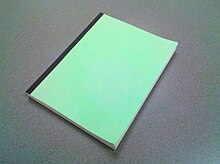This is an essay on notability. It contains the advice or opinions of one or more Wikipedia contributors. This page is not an encyclopedia article, nor is it one of Wikipedia's policies or guidelines, as it has not been thoroughly vetted by the community. Some essays represent widespread norms; others only represent minority viewpoints. |
| This page in a nutshell: If an article is based on only one source, there may be copyright, original research, and notability concerns. |

According to Wikipedia's general notability guideline, a topic is presumed to be notable if it has received significant coverage in reliable secondary sources that are independent of the subject. Note that it says "sources" plural.
Following this guideline, a subject for which only one source can be cited is unlikely to merit a standalone article.
Remember however, notability criteria consider whether sufficient sources exist, not merely how many have already been cited in the current version of the article, i.e., "can be cited" is not the same as "are cited". Therefore, rather than judging a single-source article non-notable and listing it for deletion, please add the template {{onesource}} at the top of the article, so that someone may remedy the issue. Alternatively, you can search for reliable sources yourself, and add them to the article.
For single-source sections, the template {{onesource|section_name}} can be added, if you think that only one source is not enough for it.
In addition to notability, single-source articles may suffer from other problems.
- Copyright violations: if an article has just one source, it may be an exact copy of the source provided, or a derivative work of that source, and therefore a copyright violation; mere paraphrasing, without sufficient originality, may not be enough to avoid copyright infringement. Under the doctrine of substantial similarity, a work can be found to infringe copyright even if the wording of text has been changed. Wikipedia's Copyright FAQ recommends using multiple sources to avoid substantial similarity infringement.
- Any such articles that are not copyright violations (for example, because the infringed source is in the public domain) may still constitute plagiarism.
- Original research: information in a single-sourced article beyond what is drawn from its lone source is likely original research – facts and ideas not already published by reliable sources.
- Dictionary definitions: Wikipedia is not a dictionary. Under no circumstances can an article be supported solely by a dictionary entry.
- Inaccurate information: without additional citations providing access to further information about the single source's contents, it is possible for inaccurate or outdated material to persist.
Lone source published by the article's subject
editSome of the least permissible articles are those whose lone source cited is published by the article subject's organization. This constitutes a conflict of interest. Any company, organization, group, or individual interest has the ability to publish promotional material about itself.
In some cases, this self-published material may resemble properly published material in many ways.
A paper by a political think tank or lobby group may cite a large number of sources and contain references formatted according to the norms of a journal article. The organization may call itself an "Institute" or "Research Unit". The paper looks like a paper from a peer-reviewed journal – but the two papers are completely different in terms of their reliability. The think tank or lobby group paper was published by an advocacy group, whereas a scholarly paper must be submitted to review by the top experts in the field, corrected by the author, and it is then published by an independent journal with a reputation for fact-checking and accuracy.
Self-published sources do not demonstrate that people independent of the subject consider it notable enough to be worthy of attention. Therefore, self-published sources cannot be used to establish notability. At the same time, non-promotional information of non-controversial validity may be taken from a self-published source after notability has been established.
An article that relies entirely on information from the subject itself may be deleted, possibly under speedy deletion criteria G11, if a reasonable search shows there are no independent sources.